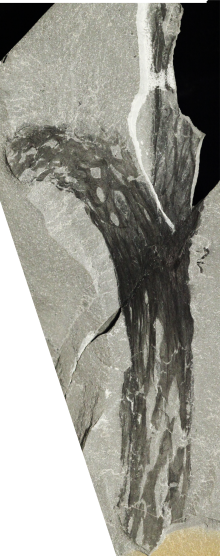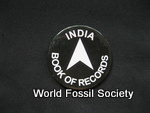Paleontologists have finally identified two kinds of mysterious fossils misidentified for a century — and traced them both to some phallus-shaped worms that lived 505 million years ago and built themselves some very elaborate homes.Key to solving the mystery was an extraordinary new fossil bed discovered just four years ago and insights gained by the scientists through dissecting the rotting carcasses of some modern worms.

An Oesia fossil shows that it has an acorn-shaped structure near the top and a bright bulbous structure at the other end used to anchor the worm in its tube. (Jean-Bernard Caron)
In 1911, American paleontologist Charles Walcott collected a fossil of a strange worm called Oesia disjuncta at the Burgess Shale of B.C.’s Yoho National Park, a now world-famous fossil bed that Walcott had discovered two years earlier.Another unusual find at the Burgess Shale was Margaretia dorus, which paleontologists proposed in 1933 was an extinct, tubular algae.
Researchers have now concluded that Oesia is a relative of penis-shaped marine animals that still exist today, called acorn worms, and Margaretia was a tubular home that it built for itself, they report in the journal BMC Biology this week.

Margaretia dorus is the name given to a fossil that was originally believed to be a strange kind of tubular algae. The fibrous tubes with lots of pores turn out to be the homes built by Oesia. (Jean-Bernard Caron)
Acorn worms aren’t related to earthworms or parasitic worms such as roundworms. Instead, they belong to a group of animals called hemichordates that are more closely related to sea urchins and starfish; and to chordates, the group of animals that includes humans and many other animals with a backbone.
Modern acorn worms don’t build and live in tubes. Instead, they bury themselves in the mud of seashores around the world.But several years ago, Jean-Bernard Caron, a paleontologist at the Royal Ontario Museum in Toronto, and some colleagues identified a Burgess Shale fossil that appeared to be a tube-dwelling acorn worm, namedSpartobranchus tenuis.
Karma Nanglu, lead author of the new paper, said previous decades saw a lot of debate about what kind of animal Oesia was, but researchers didn’t have much to go on other than fragments of poorly preserved specimens.
“Oesia is an extremely rare animal at the original location where it was discovered,” said Nanglu, a PhD student working with Prof. Jean-Bernard Caron at the University of Toronto.
Key: WFS,World Fossil Society,Riffin T Sajeev,Russel T Sajeev



 July 11th, 2016
July 11th, 2016  Riffin
Riffin  Posted in
Posted in  Tags:
Tags: 